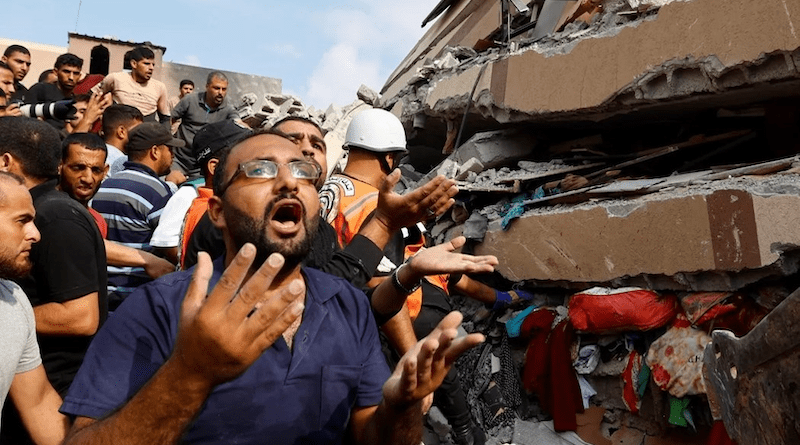Israel-Palestine War Could Further Test EU’s Foreign Policy – OpEd
By EurActiv
By Alexandra Brzozowski
(EurActiv) — As Russia’s war on Ukraine continues to rage in the east, tensions between Serbia and Kosovo and Azerbaijan’s offensive in Nagorno-Karabakh, Europe faces a new challenge in its neighbourhood with the significant escalation in the Middle East after Hamas launched a ‘surprise’ attack on Israel on Saturday (7 October).
The new conflict in the EU’s near neighbourhood, which has so far seen more than 500 deaths, is set to heap more pressure on the bloc as it finds itself in a series of crisis management efforts.
It also comes just weeks after the EU had hoped to drive a new ‘incentives’-focused Middle East peace initiative aimed at re-starting talks between Israel and Palestine.
Hamas had caught Israel off-guard early Saturday with thousands of rockets fired and dozens of heavily armed gunmen storming into Israel’s south. Israeli Defence Forces (IDF) responded by striking Hamas targets in Gaza.
“We are at war,” Israeli Prime Minister Benjamin Netanyahu declared. “And we will win,” he said in a message to Israelis.
Meanwhile, Israel’s military early Sunday appears to be preparing for a ground invasion of the Gaza Strip as its operation to free hostages and seize Hamas militants still in Israeli territory gained steam.
Israeli officials said at least 250 Israelis died in Hamas attacks on Saturday, with more than 1,590 wounded. At least 230 Palestinians have been killed and 1,610 wounded in Gaza by Israeli retaliation after the Hamas attack.
Even during the so-called Second Intifada, a major Palestinian uprising in the early 2000s, there were never a hundred or more deaths on a single day.
Overnight, the IDF recaptured all but eight sites held by Hamas, the Palestinian militant group, and began conducting house-to-house sweeps for any remaining gunmen.
European leaders condemned Hamas’s surprise attack on Israel early Saturday and proclaimed Israel’s right to defend itself. Turkey said it is ready to help de-escalate the tensions, possibly looking at a mediator role.
“The priority now is to cease violence immediately and to deescalate, as well as to release all hostages,” the EU’s chief diplomat Josep Borrell told reporters, who said on Sunday he had spoken to both Israeli Foreign Minister Eli Cohen and Palestinian Prime Minister Mohammad Shtayyeh.
“The scale of the aggression has taken the international community by surprise, but we were aware that going forward without peace was not sustainable,” Borrell told reporters.
“As we said in the statement earlier today, the EU recalls the importance of working towards a lasting and sustainable peace through reinvigorated efforts in the Middle East Peace Process,” Borrell said.
“That is precisely why, together with the League of Arab States, Saudi Arabia, Egypt and Jordan, we started a joint initiative to help revitalise the Two-State solution,” he said.
Almost 50 foreign ministers from Europe and the Middle East met on the sidelines of the United Nations General Assembly in September to unveil a new initiative, dubbed the ‘Peace Day Effort’, which aims to revive the long-dormant peace process between Israel and Palestine.
“The EU’s position remains that the way forward lies in the two-state solution,” Borrell added.
Early next week, Borrell is scheduled to be in Muscat, Oman, for a meeting of the EU and Gulf Cooperation Council (GCC) foreign ministers, where the escalation will likely top the agenda.
While initial responses to the terror attacks from Israel’s Arab neighbours indicate that while they are likely to stick to support for Palestinians, they are wary of the escalation derailing recent efforts of normalisation in the region.
The Saudis have never recognised Israel as a nation and always officially sided with the Palestinians.
In US-brokered talks aimed at Saudi normalisation with Israel in a deal involving American security guarantees for Riyadh, Saudi Arabia called on both sides to exercise restraint.
In a phone call with Borrell, Jordan’s Foreign Minister Ayman Safadi stressed the need for international action to stop escalation in Gaza and “create a real political horizon to end the occupation”, the Jordanian Foreign Ministry said in a statement.
Analysts, meanwhile, are split on whether the Hamas attack could be seen as a violent veto of the recently positive signs in Middle East peace efforts, which have been slowly taking shape between the US, Saudi Arabia and Israel.
“This must have taken months to prepare to coordinate land/air/sea forces in a coordinated matter, each with clear tactical objectives and preparedness,” Jerome Drevon, senior analysis at Crisis Group, said.
“It can’t be just a short-term response to recent developments, including Saudi-Israeli normalisation,” he added.
Some also point to the fact that the conflict has beneficiaries outside Hamas, notably Iran – and Russia.
The Kremlin is likely to exploit Hamas’ attack on Israel to divert Western support and attention away from Ukraine, the Institute for the Study of War (ISW) reported in its daily assessment.
For Europe, that adds another headache as it is increasingly forced to split its attention between all crises.
As a certain European foreign minister told Euractiv earlier this week in Kyiv, even before the recent developments: “Lots of small and big fires everywhere – and we have no good fire extinguisher at hand.”

